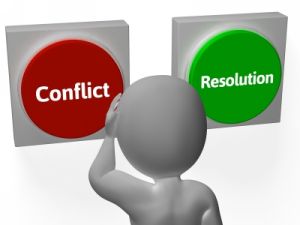Reasons for Conflict (Understanding Conflict)

The previous section called "Understanding Ourselves" discussed destiny, the nature of humankind, our beliefs, and how we interpret reality in many different ways. With a better understanding of ourselves, we can now explore the section called "Understanding Conflict". This section discusses reasons that cause conflicts such as different belief systems and economic interests. It also covers why cooperation is so important in reducing conflict, and taking us to the brightest future possible.
There seem to be two main reasons for conflict between countries, cultures, or individuals. These are over economics or over belief systems (religious and political beliefs in most cases). Both of these occur because, like any creature, we perceive that our security and survival are threatened. Unfortunately, in many cases, such conflicts can be avoided given that we have the capacity to communicate and resolve them with each other. Before discussing such conflicts, I will first present another analogy showing the similarity that we have between ourselves, and with the conflicts that we face against the forces of Nature.
Imagine that you are on your farm in the Prairies of Canada and a storm is forming over your land. Basically, you are about to be in conflict with something that threatens your security and survival. It could just as easily be a tornado, earthquake, famine, a tsunami, or a volcano. Regardless, you have a few choices. You can attempt to stop the storm, you can stand your ground and contend with the storm when it hits you, or you can leave and let the storm consume your farm. Basically, all of these options are actions that one country might take when in conflict with another country. You can attempt to stop the country from competing with you, you can stand your ground and fight, or you can stand down and let the country take your territory and resources.

The one difference worth noting in the above analogy is that we cannot attempt to communicate with the storm in order to diffuse the conflict, as we could do with another country. We cannot ask the storm to reconsider its path, or attempt to mediate some type of solution with the storm. It is simply a force of Nature following the path it must take based on the laws of physics. It is science, the flow of matter and energy, and there is no path for diplomacy or cooperation. The difference with countries though, is that if they have a conflict, they have the choice to cooperate and reconsider the reason for the conflict. Going further, countries can even be preemptive and attempt to deal with issues before conflicts occur. I believe that all too often countries have conflicts that are avoidable. They are usually due to conflicting beliefs such as religion, or the desire to acquire the territory and resources of another country.
The storm example was meant to show how we face conflicts as part of our survival with both the environment, and with each other. Unlike conflicts with the environment though, countries have the option to reconsider reasons for conflict between each other. We can neutralize them before they start. Given the impact of our technologies on Life and Earth, I believe it is becoming more important that we recognize that we need more diplomacy and cooperation.
I understand that sometimes diplomacy simply does not work and that some type of confrontation often follows. If this is the case, given the impact of technologies that exist and have yet to come, it may soon get to the point where countries have no choice but to cooperate and live under universal global guidelines. This may be the only way to minimize the chance of unnecessary conflicts over beliefs and economic needs. Now I will look at the source of some of our different beliefs such as religion, ego, and discrimination.
1) Conflict over beliefs
Conflict over religious beliefs

Our abilities of "reason" and "abstract thought" may have enabled us to explore our religious beliefs, thereby bringing us closer to our truths. At the same time, this has become one of the main reasons we have conflicts. One might call it a gift to have the capability to conceive and imagine what might happen to us after we die based on our religion, a state that other animals may not have come to achieve. We can "conceptualize" what might come to be, and indeed there is no one that can confirm that what we conceive is not true. Maybe one might believe they will go to a lush world of happiness forever, to Heaven and see all those that they knew in this life, or possibly be taken from this world to another world - the next level of one's evolution.
Our religions are a part of the colour of our world, and each of us may find our own truth and comfort in them. Whether our ability for abstract thought caused us to "conceive" our religions, or whether abstract thought gave us the ability to "see the truth" in our religions, our religious beliefs have given us many reasons to find conflict. Such conflict between each other is problematic given that we live in a world that requires us to get along more and more. I think we can all agree that there are many disagreements that occur between cultures and countries because of religion.
If it is the case that our ability to explore our religious beliefs is a product of our evolving intelligence, unique to human beings, it might be wise for us to exercise more restraint when we fight over these beliefs. For example, after death you may imagine one world, and I imagine another, neither of which we live in today. Yet, we find conflict in our current world over the fact that we do not agree on these worlds that we imagine will be. Could it be that our ability to "conceive" in virtually unlimited ways allows us to expand each of our worlds so much that we create unlimited reasons to fight with one another, unlike other animals? Could it be that because we are so immersed in our own truths and beliefs, that we are so close to our own egos and how we define ourselves, that in turn we become blinded to the things we have so much in common - that connect us? If we wish to get along with each other better, maybe we need to be more aware of how our belief systems can cause us to confront each other.
It is a wonderful feeling to believe that we have found the truth, which may be in our religion, but is it a good enough reason for us to fight with one another, where ultimately we might destroy each other and all life? Are we willing to sacrifice the lives of our loved ones, and our future generations, for the sake of our religious beliefs? Only we have the ability to modify or relax our beliefs - our truths - in order to work together with our fellow human beings who may have conflicting beliefs.
It may be that our intelligence has enabled us to "conceive" all possibilities, but the religious beliefs that we sometimes have conflict over may be another side effect from our quest for technology that threatens us. Even if one of our religions is the truth, I think we need to realize that if we do fight over such beliefs, in the near future the price to Life and Earth may be much greater than it ever was. Maybe the solution lies in more readily accepting our differences, and instead trying to find the many things we have in common as human beings.

Conflict over other beliefs
I have discussed religion as one type of belief unique to humans. Briefly I just want to note some other beliefs that seem to be rare in animals and common in humans. Like religion, these beliefs leave humans with many reasons to see each other as different rather than similar. They are ingredients that can result in more potential conflict.
-
Discrimination
-
Ethics - Right and wrong
-
Ego, Self-image, Patriotism
Countries, cultures, and individuals go to great extremes to protect their belief systems. They often take the form of religions, discriminating racial beliefs, simple ideas of what is right and wrong, patriotism, or any beliefs where we feel the need to protect our egos and self-image. In attempting to protect these ideas of ourselves, we are more vulnerable to conflict than other creatures. In order to reduce our potential for conflict we must recognize this vulnerability and make a conscious effort to question whether our conflicts over beliefs are warranted. In the world as it once was, we could engage in conflicts with less concern over the rest of the planet, but we are moving further and further toward a world where we affect each other, due to our technologies. We are impacting Earth at a geometric rate, while at the same time, the size and ability of Earth to handle our impact is not about to change. We must bypass conflicts due to conceived beliefs and focus on the future of Life and Earth.
2) Conflict over economic interests

In addition to conflicts over beliefs, like animals, we have very real conflicts over our territory. I place this type of conflict under the area of economic interests, which is discussed in more detail in the next section called "Economic Disparity".
If you will notice the animals on the right, like human beings, they also seem to compete over territory, resources, mates, and so on. Under most circumstances, animals within the same species fight on a one on one basis, traditionally thought of as the process of natural selection. This "weeds" out the weak from the strong within a species. Very rarely does one witness large "groups" within a species (like countries or cultures) fighting between each other, nor do you find animals within a species resolving their conflicts with much more than a one to one battle of brute force. On the other hand, human beings, with their technology, often resolve their conflicts in ways that impact each other and the environment much more significantly. This is clearly seen with nuclear weapons and highly strategic military confrontations. Examples to illustrate this are simply shown by the many wars that have occurred where entire countries have fought with each other, causing casualties in the hundreds of thousands.
It is interesting how we fight for territory that we think is ours. One might say that North America was truly owned by the Native Indians until the Europeans settled it, but then what of those that may have lived in North America before the Native Indians?

How long does any culture or country really own any territory? Is the time infinite? Do humans really have a greater right to any territory that they might take from other creatures? If you buy a piece of property in the wilderness and build a cabin on it, you may end up destroying bird nests and the habitat of other animals in the area. Is this any different than one country invading the territory of another country?
What right does anyone have to any other creature's territory or resources other than that they are able to take it? Ultimately, it seems that power rules, but hopefully humanity can prevent territorial conflicts that might escalate by working together. I think it is worth asking ourselves, "If the world were working together as if it were one country, would we find many of the territorial disputes that exist today"?
As an example of how territorial differences affect us today, consider that currently there are issues with the territorial rights of the Northwest Passage. Global warming has opened a great deal of the Northwest Passage. It has allowed exploration of rich resources and enabled more efficient routes for world transport. Many countries are taking a greater interest in having a claim to the territory. One can be sure that there will be conflicts over the land, and to say who owns it, is a big question. Ultimately, what matters is that we find ways to avoid disputes over territory, for the benefit of all humanity.
Comments on human conflict

I have discussed how human beings assume, and how we develop our diverse belief systems. Whether we are countries or cultures, we have so many religions, so many ways to discriminate, and we seem to have an endless list of right and wrongs that are unique to our different cultures and countries. Ultimately, if we allow ourselves to distance each other over our diverse beliefs and our territorial disputes, we will continue to find conflict. In a world where we are all affecting each other more and more, it is urgent that we learn to work beyond our differences. If we do find technologies with destructive side effects that are accessible to all, then conflicts will lead to unforeseen significant consequences. There may be no way to turn back the clock. Our leaders need to understand that the countries of the world must work together now. We must show more tolerance over our differences so that we might move forward safely. I do not know all the solutions, but I do know the world has changed and our playing ground has changed. Unlike the past, it is becoming riskier to engage in conflicts. I feel it is fair to conclude that the different cultures and countries of the world must make a greater effort than ever to minimize conflicts and find ways to work together. Rather than wait for more serious consequences from the side effects of our technologies, we should prepare now by learning to work together for our common interest - the preservation of Life and Earth.
Being preemptive is the best way to prevent conflict
I have discussed various ways that humans might deal with conflicts. There is one approach that is always successful though. It is simply to be preemptive, and prevent conflicts before they occur. This may seem obvious, but imagine if we could always predict accurately how potential conflicts, or problems, would unfold from our actions. Such knowledge would be like having a crystal ball. It would always enable us to know in advance the optimal course of action. Imagine if we already knew the specific consequences from the current paths we are taking with climate change, nuclear weapons, exploring genetics, and advancing artificial intelligence. Imagine if we could see the future and be preemptive. We can at least come close to having this crystal ball if we gather the necessary data, use it together, and then attempt to predict the results of our actions accurately.
If we can understand the reasons for potential conflicts, and prevent them before they occur, then we simply avoid the conflicts. I emphasize being preemptive because humans often assume that conflict is acceptable, and that our success is in resolving the conflict. The real success though is understanding our environment beforehand, so that we can prevent the conflicts from ever starting. For example, we feel successful if we find new ways to extract more resources, process more waste, and make more food for a growing world population - a population that might otherwise be in conflict. Are we forgetting that these needs might be unnecessary if, instead, we had a long term plan to stabilize human population?
As a more specific example, consider the Covid-19 virus that erupted in 2020. This resulted in a major conflict between humans and a virus, not so different than the storm example previously mentioned. Our success has understandably become measured in the efficacy of vaccines, and the various methods that countries use to contend with the threat, such as by wearing masks, and social distancing. Ultimately though, it goes without saying, that the best solution would have been to be preemptive. Ideally, we would have had the knowledge to prevent the virus from ever occurring, or at least been more prepared to deal with it. This might have meant having the data and science to understand why it occurred, and ensuring that all countries cooperated immediately in order to prevent spread of the virus. Our mapping of asteroids in space is an example where countries are being preemptive and cooperating. As a result we are more prepared for this potential conflict between ourselves and the environment. Our mapping of the skies allows us to be more prepared if we are faced with an asteroid that might cause an extinction level event to all life on the planet.
In various segments in this book I have suggested the creation of a Global Education System (GES) in order to improve our global intelligence. We absolutely MUST become more intelligent, and cooperate globally with that intelligence, in order to prevent conflicts between each other. In addition, the GES would also give us the intelligence to prevent conflict between ourselves and such environmental threats as asteroids, viruses, and climate change. The best solution to conflict is to have the intelligence to be preemptive, and to act before the conflict occurs in the first place.
In this section I have focused a fair bit on how countries have conflicts over belief systems. In the following section, I discuss more about why countries have conflicts over economic interests, and how such conflicts might be resolved.
